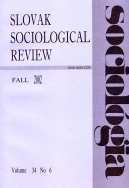Slovaks and Czechs on the Threshold of the European Union. On the Possibility of Mutual Emancipation of Nations
Slovaks and Czechs on the Threshold of the European Union. On the Possibility of Mutual Emancipation of Nations
Author(s): Pavel MachoninSubject(s): Social Sciences
Published by: SAV - Slovenská akadémia vied - Sociologický ústav
Keywords: Czechoslovak nation; national emancipation; developments of nations; national identity; Historical experience of common life of Slovaks and Czechs; General conceptions of nations and their relationships; The experience of sociological research into Slovak
Summary/Abstract: The long-lasting historical co-existence of the closely kindred Slovak and Czech nations went through periods both of dissociation – caused mainly by the intervention of their more powerful neighbours – and of association and cooperation in common fight for national independence. Several times in their history they became parts of the same states, two times they created a common state. Though the co-existence of these two nations was not free of points of friction, in general co-operative and friendly elements clearly prevailed in their co-habitation. Even the necessity to correct the image of the possibility of creation an artificial Czechoslovak nation and the final dissociation of the Czecho-Slovak Federation into two sovereign states occurred in peaceful forms and did not become the beginning of a lasting conflict. Historical facts testify for the statement that both the integrative and disintegrative trends in the relationships of Slovaks and Czechs finally have led to their mutual national emancipation and made possible their friendly mutual assistance and cooperation within the Visegrád group and other Central European organizations as well as in the issue of their simultaneous accession into the European Union. Many determinants of various kinds influence the emergence and developments of nations. These ethnical droppings are going through historical changes in which one can find out more or less successful phases. From this point of view, it is important to know if this or that nation has at present achieved this or that position on the scale of modernity, application of social justice in their social systems, economic efficiency, educational and cultural level and creativity and developments of democracy and civic society. However, the author is pleading for a certain relativisation of significance of individual criteria of evaluation, to historisation and preference of complex approach to the history of nations as a whole. One should enrich the image of nations as objectively emerged and historically developed groupings by understanding them as large communities being aware of their specific identities to such a degree that they are able to write their own history above all by their own forces, by their various cultural and civilizational as well as civic and political activities on the base of the given internal structures and in the contemporary international context. Under this angle the measuring of positions of individual nations on the mentioned partial scales has only an auxiliary significance. Far more important is to understand from what outcome and in what direction are they going within the complex of the partial characteristics including also many other ones, which we are so far not able to operationalise on any scales. Taking into account both successes and failures in the field of the long-lasting common research-work done by Czech and Slovak sociologists, the author proposes some principles of an adequate ..........
Journal: Sociológia - Slovak Sociological Review
- Issue Year: 2002
- Issue No: 6
- Page Range: 547-562
- Page Count: 16
- Language: English

